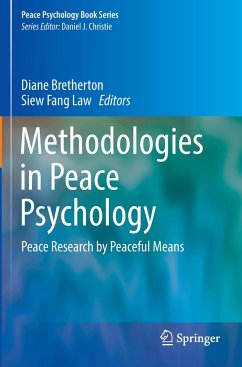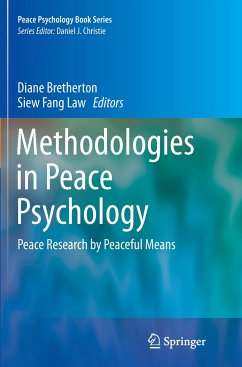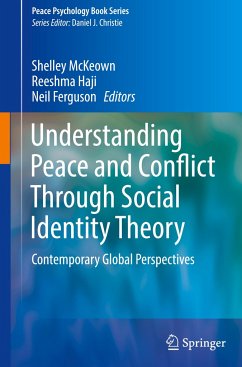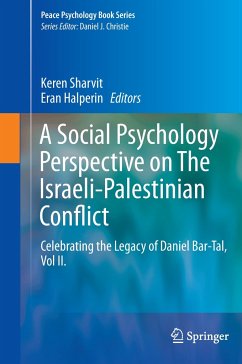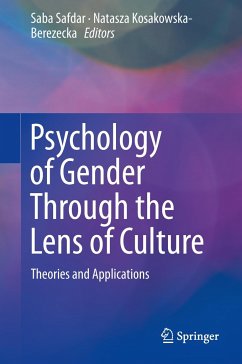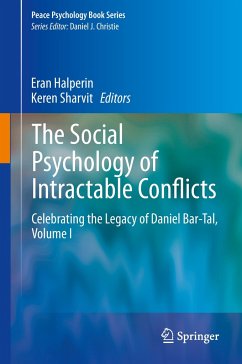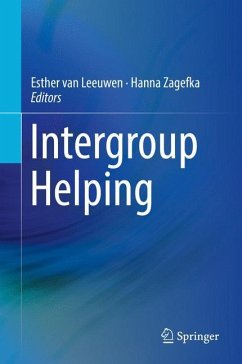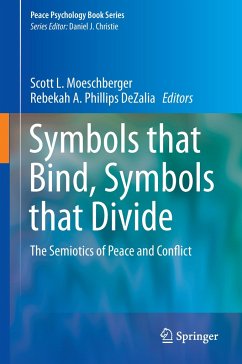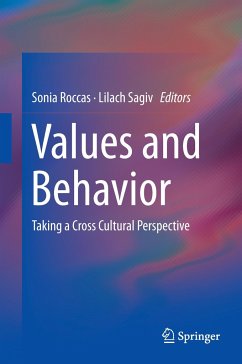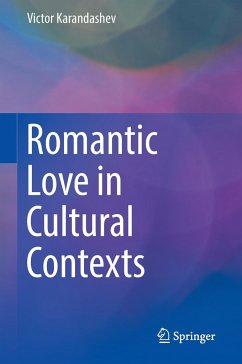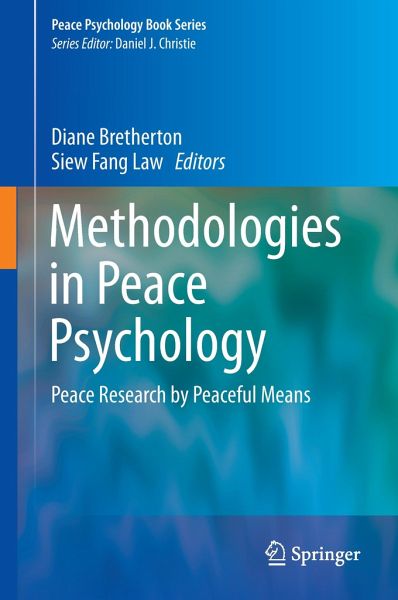
Methodologies in Peace Psychology
Peace Research by Peaceful Means
Herausgegeben: Bretherton, Diane; Law, Siew Fang

PAYBACK Punkte
19 °P sammeln!
This volume looks at research methods through the lens of peace studies and peace values. Apart from reviewing established methods from peace psychology, it presents some innovative ideas for conducting research in the area of peace psychology. Many of these methods are drawn from the field, from activities used by active peace practitioners. A critical component of this volume is its core argument that peace research should be conducted by peaceful means, and should model peaceful processes.Organized thematically, the volume begins with a review of the established best practices in peace psyc...
This volume looks at research methods through the lens of peace studies and peace values. Apart from reviewing established methods from peace psychology, it presents some innovative ideas for conducting research in the area of peace psychology. Many of these methods are drawn from the field, from activities used by active peace practitioners. A critical component of this volume is its core argument that peace research should be conducted by peaceful means, and should model peaceful processes.
Organized thematically, the volume begins with a review of the established best practices in peace psychology research methodology, including methods for qualitative research, for quantitative research, and participative action networks. In doing so, it also points to some of the limitations of working for peace within the tradition of a single discipline and to the need to expand psychology methodology, to methodologies. Therefore, the second half of the volume proceeds to explore the realm of innovative, relatively unorthodox research methods, such as participatory and workshop methods, the creative arts, and sports for research purposes. The use of new advances in information technology to conduct peaceful research are also discussed. The concluding chapters synthesize key issues from the previous chapters, and links peace psychology with ideas and implementation of research designs and practices. Finally, it discusses the nature of academic knowledge, and more specifically, academic knowledge in peace psychology, and where that fits into the mission to build a more peaceful world.
Overall this book aims to provide peace psychologists with an array of possibilities and best practices for approaching their research. Many researchers find the experience of doing research a somewhat lonely, if not isolating, experience. Methodologies in Peace Psychology: Peace Research by Peaceful Means aims to alleviate this feeling as the use ofthese more innovative methods leads to a closer engagement with the community and a much more social experience of research. This volume is a useful tool for both new and experienced researchers because it provides leads for idealistic young researchers who want their work to make a difference, in addition to encouraging more reflection and analysis for experienced peace psychologists.
Organized thematically, the volume begins with a review of the established best practices in peace psychology research methodology, including methods for qualitative research, for quantitative research, and participative action networks. In doing so, it also points to some of the limitations of working for peace within the tradition of a single discipline and to the need to expand psychology methodology, to methodologies. Therefore, the second half of the volume proceeds to explore the realm of innovative, relatively unorthodox research methods, such as participatory and workshop methods, the creative arts, and sports for research purposes. The use of new advances in information technology to conduct peaceful research are also discussed. The concluding chapters synthesize key issues from the previous chapters, and links peace psychology with ideas and implementation of research designs and practices. Finally, it discusses the nature of academic knowledge, and more specifically, academic knowledge in peace psychology, and where that fits into the mission to build a more peaceful world.
Overall this book aims to provide peace psychologists with an array of possibilities and best practices for approaching their research. Many researchers find the experience of doing research a somewhat lonely, if not isolating, experience. Methodologies in Peace Psychology: Peace Research by Peaceful Means aims to alleviate this feeling as the use ofthese more innovative methods leads to a closer engagement with the community and a much more social experience of research. This volume is a useful tool for both new and experienced researchers because it provides leads for idealistic young researchers who want their work to make a difference, in addition to encouraging more reflection and analysis for experienced peace psychologists.





